章振邦英语语法第五版Tense and Aspect
章振邦《英语语法教程》教学大纲
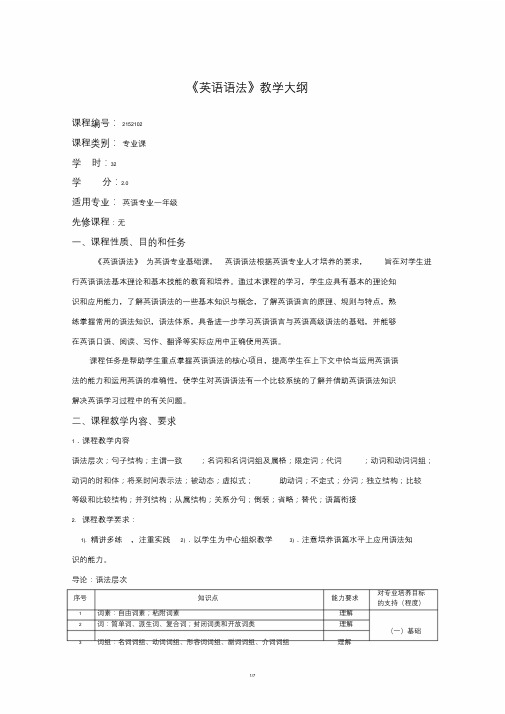
《英语语法》教学大纲课程编号:2152102课程类别:专业课学时:32学分:2.0适用专业:英语专业一年级先修课程:无一、课程性质、目的和任务《英语语法》为英语专业基础课,英语语法根据英语专业人才培养的要求,旨在对学生进行英语语法基本理论和基本技能的教育和培养。
通过本课程的学习,学生应具有基本的理论知识和应用能力,了解英语语法的一些基本知识与概念,了解英语语言的原理、规则与特点,熟练掌握常用的语法知识,语法体系,具备进一步学习英语语言与英语高级语法的基础,并能够在英语口语、阅读、写作、翻译等实际应用中正确使用英语。
课程任务是帮助学生重点掌握英语语法的核心项目,提高学生在上下文中恰当运用英语语法的能力和运用英语的准确性,使学生对英语语法有一个比较系统的了解并借助英语语法知识解决英语学习过程中的有关问题。
二、课程教学内容、要求1.课程教学内容语法层次;句子结构;主谓一致;名词和名词词组及属格;限定词;代词;动词和动词词组;动词的时和体;将来时间表示法;被动态;虚拟式;助动词;不定式;分词;独立结构;比较等级和比较结构;并列结构;从属结构;关系分句;倒装;省略;替代;语篇衔接2. 课程教学要求:1). 精讲多练,注重实践2).以学生为中心组织教学3).注意培养语篇水平上应用语法知识的能力。
导论:语法层次序号知识点能力要求1 词素:自由词素;粘附词素理解对专业培养目标的支持(程度)2 词:简单词、派生词、复合词;封闭词类和开放词类理解(一)基础3 词组:名词词组、动词词组、形容词词组、副词词组、介词词组理解4 分句:独立分句和从属分句;简单分句和复杂分句;主句和从句;限定分句、非限定分句、无动词分句掌握5 句子:完全句和不完全句;简单句、并列句、复杂句、并列复杂句掌握第1 讲:句子结构序号知识点能力要求1 主谓结构和句子分析理解对专业培养目标的支持(程度)2 基本句型掌握(一)基础3 基本句型的转换与扩大掌握第2、3 讲:主谓一致序号知识点能力要求1 主谓一致的指导原则理解2 以-s 结尾的名词作主语的主谓一致问题掌握对专业培养目标的支持(程度)3 以集体名词作主语的主谓一致问题掌握4 以并列结构作主语的主谓一致问题掌握5以表示数量概念的名词词组作主语的主谓一致问题掌握6其他方面的主谓一致问题掌握(一)基础第4、5 讲:名词、名词词组和名词属格序号知识点能力要求1 名词分类了解2 名词词组的句法功能理解对专业培养目标的支持(程度)3 名词的数了解4 单位词理解5名词属格的构成、意义和用法掌握6独立属格和双重属格掌握(一)基础第6、7 讲:限定词序号知识点能力要求限定词与三类名词的搭配关系理解1 对专业培养目标的支持(程度)2 限定词与限定词的搭配关系理解3 Many、much/few 、little/some 、any/all 、both 等若干限定词用法比较掌握(一)基础4 冠词的类指与特指理解5 各类名词前的冠词用法掌握第8、9 讲:代词序号知识点能力要求对专业培养目标的支持(程度)1 代词及其先行项在数、性、人称方面的一致掌握2 代词的格理解3 物主代词、反身代词、人称代词的类指用法掌握(一)基础4 代词的照应理解第10 讲:动词和动词词组序号知识点能力要对专业培养目标求的支持(程度)1 动词的分类理解2 动词的时、体、态、式概说掌握(一)基础第11、12 讲:动词的时和体序号知识点能力要求1 一般现在时的用法掌握2 一般过去时的用法掌握3 现在进行体的用法掌握对专业培养目标的支持(程度)4 过去进行体的用法掌握(一)基础5 现在完成体和现在完成进行体的用法掌握6 过去完成体和过去完成进行体的用法掌握7 关于完成体用法的几点补充说明掌握第13 讲:将来时间表示法序号知识点能力要求对专业培养目标的支持(程度)1 英语中表示将来时间的几种结构掌握2 表示将来时间的几种结构的用法掌握(一)基础第14、15 讲:被动态序号知识点能力要求1 被动句的使用场合理解2 两种被动句型的转换掌握对专业培养目标的支持(程度)3 英汉被动意义表示法比较理解(一)基础4 主动结构表示被动意义的问题掌握5 被动结构和系表结构的比较理解第16 讲:虚拟式序号知识点能力要求对专业培养目标的支持(程度)1 语气的定义和种类、虚拟式的定义理解2 虚拟式的两种形式:be- 型虚拟式;were- 型虚拟式理解3 两种虚拟式的意义和用法掌握4其他表达假设意义的形式和用法掌握(一)基础第17、18 讲:助动词序号知识点能力要求1 助动词的分类、形式和功能理解2 助动词的缩略形式了解对专业培养目标的支持(程度)3 情态助动词的推测性用法和非推测性用法掌握(一)基础4 情态意义表示法掌握5 基本助动词和半助动词的意义和用法理解第19、20 讲:不定式序号知识点能力要求对专业培养目标的支持(程度)1 非限定动词的定义与分类理解2 不定式的形式与功能掌握(一)基础3 不定式符号的问题理解4 不定式与形容词的搭配关系掌握5 不定式与名词的搭配关系掌握6 不定式与动词的搭配关系掌握第21、22 讲:分词序号知识点能力要求对专业培养目标的支持(程度)1 -ing 分词以及-ed 分词的形式与功能理解2 -ing 分词与动词的搭配关系掌握3 既能直接带不定式有能直接带-ing 分词的动词掌握4 -ed 分词作前置修饰语和补语掌握(一)基础5 不定式、-ing 分词和-ed 分词的用法和比较掌握6 悬垂分词的定义和用法理解第23、24、25 讲:形容词和形容词词组;副词和副词词组;比较等级和比较结构序号知识点能力要求1 形容词、副词的定义、分类和功能理解2 形容词和副词的比较等级理解对专业培养目标的支持(程度)3 比较结构的基本形式: as , as 结构/ more , than 结构/ (the)+ 形容词/ 副词最高级+比较范围结构其他比较结构的形式与用法:more, than /not结构的其他用法掌握(一)基础4 so, as 与not so much, as/not more than 与no more than/ the掌握more, the more 与more and more第26 讲:介词和介词词组序号知识点能力要求1 介词与形容词、动词、名词的搭配关系掌握对专业培养目标的支持(程度)2 复杂介词掌握(一)基础3 介词词组与某些限定分句的转换关系掌握第27 讲:陈述句、疑问句、祈使句、感叹句序号知识点能力要求1 肯定陈述句和否定陈述句了解对专业培养目标的支持(程度)2 疑问句的类型和用法:一般疑问句、特殊疑问句、选择疑问句、附加疑问句掌握(一)基础3 祈使句的意义和用法掌握4 感叹句的意义和用法掌握第28、29 讲:存在句;IT- 句型序号知识点能力要求1 存在句的结构特征理解对专业培养目标的支持(程度)2 存在句的非限定形式的用法:there to be ;there being 结构了解3 “虚义”it 和先行it 掌握4 it“分裂句引导词”掌握(一)基础4/7序号知识点能力要求对专业培养目标的支持(程度)1 并列结构的各种形式理解2 and ,or but 并列连词的意义和用法理解3 从属连词和从属句的分类理解4 限定从属分句的分类和用法:名词性分句、形容词性分句(关系分句)和福此行分句(状语分句)掌握5 非限定从句的结构模式和句法功能:不定式分句、-ing 分词分句-ed 分词分句掌握(一)基础6 无动词分句的结构模式和句法功能掌握7 简单句、并列句和从属句的转换掌握8 独立结构的实质和类型理解9 独立结构的意义和用法掌握第33 讲:关系分句序号知识点能力要求1 限制性关系分句和非限制性关系分句理解对专业培养目标的支持(程度)2 关系词的选择掌握3 “介词+关系代词”引导的分句结构掌握4双重关系分句和嵌入式关系分句了解(一)基础第34 讲:条件句序号知识点能力要求对专业培养目标的支持(程度)1 条件句的类型理解2 条件句四种类型的基本形式和变体形式掌握(一)基础第35 讲:直接引语和间接引语序号知识点能力要求陈述句的间接引语:时间的变化(现在时间推移到过去时间、过去1时间推移到过去的过去、将来时间推移到过去将来时间)和人称代掌握对专业培养目标的支持(程度)词、限定词、实际安装于、地点状语的变化2 疑问句的间接引语的引导词选择和交际功能理解3祈使句和感叹句间接引语的转换掌握4各类句子混杂使用的间接引语了解(一)基础第36 讲:修饰序号知识点能力要求1 名词修饰语的类型和用法理解对专业培养目标的支持(程度)2 名词词组同位语的结构形式、引导词、附加修饰成分掌握(一)基础3 限制性同位语和非限制性同位语理解第37、38 讲替代和省略序号知识点能力要求1 名词性替代、动词性替代和分句性替代的定义、省略的类型理解对专业培养目标的支持(程度)2 名词性替代词one/ones 的用法掌握3 one 分别作为替代词、类指代词和数词的用法掌握4动词替代词的用法掌握(一)基础5 分句替代词的用法掌握6 并列结构和主从结构中的省略掌握第39 讲:后置、前置、倒装序号知识点能力要求对专业培养目标的支持(程度)1 英语语序的历时发展了解2 英语的自然语序和特殊语序理解(一)基础3 后置、前置与倒装的功能和用法掌握第40 讲:从句到篇序号知识点能力要求对专业培养目标的支持(程度)1 句子和语篇:句子的意义和交际功能;句子结构的正确性和适合性理解2 语篇的逻辑、语法、词汇纽带理解3 语篇结构—句子、语段、语篇理解4语篇修饰理解(一)基础三、参考学时分配章节各章标题名称讲授学时实践学时上机学时备注导论语法层次(导论) 1第1 讲句子结构 1 第2、3 讲主谓一致 2第4 、5 讲名词和名词词组及属格 1第6、7 讲限定词 1第8、9 讲代词 2第10 讲动词和动词词组 1第11、12 讲动词的时和体 2第13 讲将来时间表示法 1第14、15 讲被动态 1第16 讲虚拟式 1 1 第17、18 讲助动词 1第19、20 讲不定式 1 1 第21、22 讲分词 1 1第23、24、25 讲形容词和形容词词组;副词和副词词组;比较等级和比较结构1 1第26、27、28 讲介词和介词词组;陈述句、疑问句、祈使句、感叹句;存在句1 1第29 讲IT- 句型 1第30 、31、32 讲并列和从属结构 1 1第33、34、35 讲关系分句;条件句;直接引语和间接引语1 1第36、37、38 讲修饰、替代与省略 1第39、40 讲倒装;语篇衔接 1 1总学时:32四、课程说明1. 本大纲依据兰州理工大学技术工程学院2014 年英语专业本科人才培养方案编写。
章振邦英语语法第五版L2

1)objects consisting of two parts: plural; or: according to the quantity meaning of the unitword 2)archives, arms, clothes, contents, eaves, fireworks, goods, minutes, morals, remains, stairs, suburbs, thanks, wages, shears: plural 3) whereabouts, dramatics: pl. & single. 4)-ings: plural(usu.) – clippings, diggings, surroundings, sweepings, filings, lodgings, earnings pl. & single – tidings 5) when a word’s plural form is same to its single form, notional concord works.: headquarters, barracks, means, series, species, works 6) “odds”- “机会,赔率”(pl.); what’s the odds? 7) “remains”- “遗体”(pl.); “遗迹、剩余物”(pl./sing.)
Problems of concord with words
Problems of concord with collective nouns as subject
1 Characteristics of collective noun: collective nouns are singular in form, but plural in meaning. 2 The choice between grammatical concord and notional concord is mostly dictated by usage.
2022英语专业《英语语法教程(章振邦)》专有名词汇总最新版
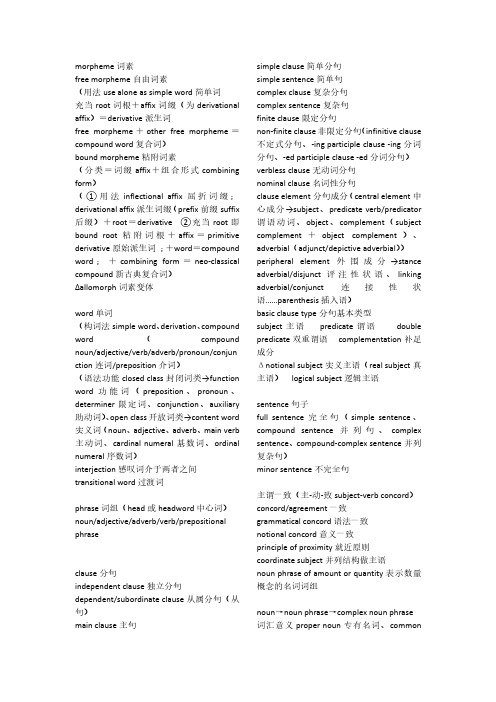
morpheme词素free morpheme自由词素(用法use alone as simple word简单词充当root词根+affix词缀(为derivational affix)=derivative派生词free morpheme+other free morpheme=compound word复合词)bound morpheme粘附词素(分类=词缀affix+组合形式combining form)(①用法inflectional affix屈折词缀;derivational affix派生词缀(prefix前缀suffix 后缀)+root=derivative②充当root即bound root粘附词根+affix=primitive derivative原始派生词;+word=compound word;+combining form=neo-classical compound新古典复合词)Δallomorph词素变体word单词(构词法simple word、derivation、compound word(compound noun/adjective/verb/adverb/pronoun/conjun ction连词/preposition介词)(语法功能closed class封闭词类→function word功能词(preposition、pronoun、determiner限定词、conjunction、auxiliary 助动词)、open class开放词类→content word 实义词(noun、adjective、adverb、main verb 主动词、cardinal numeral基数词、ordinal numeral序数词)interjection感叹词介于两者之间transitional word过渡词phrase词组(head或headword中心词)noun/adjective/adverb/verb/prepositional phraseclause分句independent clause独立分句dependent/subordinate clause从属分句(从句)main clause主句simple clause简单分句simple sentence简单句complex clause复杂分句complex sentence复杂句finite clause限定分句non-finite clause非限定分句(infinitive clause 不定式分句、-ing participle clause-ing分词分句、-ed participle clause-ed分词分句)verbless clause无动词分句nominal clause名词性分句clause element分句成分(central element中心成分→subject、predicate verb/predicator 谓语动词、object、complement(subject complement+object complement)、adverbial(adjunct/depictive adverbial))peripheral element外围成分→stance adverbial/disjunct评注性状语、linking adverbial/conjunct连接性状语……parenthesis插入语)basic clause type分句基本类型subject主语predicate谓语double predicate双重谓语complementation补足成分Δnotional subject实义主语(real subject真主语)logical subject逻辑主语sentence句子full sentence完全句(simple sentence、compound sentence并列句、complex sentence、compound-complex sentence并列复杂句)minor sentence不完全句主谓一致(主-动-致subject-verb concord)concord/agreement一致grammatical concord语法一致notional concord意义一致principle of proximity就近原则coordinate subject并列结构做主语noun phrase of amount or quantity表示数量概念的名词词组noun→noun phrase→complex noun phrase 词汇意义proper noun专有名词、commonnoun(individual noun、collective noun、mass noun/material noun、abstract noun)语法特征count/countable noun、non-count/uncountable nounnumber数→语法范畴singular number单数plural number复数(regular plural、irregular plural)partitive单位词(unit noun单位名词)case格→语法术语nominative case主格、genitive/possessive case属格/所有格、dative case与格、accusation case宾格→old English古英语genitive/possessive case、common case通格→modern English现代英语independent genitive独立属格double genitive双重属格determinerreferential meaning所指意义→specific reference特指、generic reference类指definite quantity确定数量indefinite quantity非确定数量分类:predeterminer前位限定词、central determiner、postdeterminerarticle冠词definite article定冠词indefinite article不定冠词zero article 零冠词definite specific reference确定特指(anaphoric specific reference后照应特指、cataphoric specific reference前照应特指、situational reference语境特指)indefinite specific reference非确定特指adjective形容词(open class)词的构成→one-word adjective单词形容词、compound adjective复合形容词句法功能→central adjective中心形容词、peripheral adjective外围形容词词汇意义→dynamic adjective动态形容词、stative adjective静态形容词词汇意义→gradable adjective等级形容词、non-gradable adjective非等级形容词modifier修饰语premodifier前置修饰语postmodifier后置修饰语subject complement、object complementΔcausative construction使役结构adverb→adverb phrase词的构成→simple adverb简单副词、derivative adverb派生副词词汇意义→adverb of mannar方式副词、adverb of degree程度副词、adverb of frequency频度副词、adverb of time时间副词、conjunctive adverb连接副词(the head/headword of the verb phrase when used as a linking adverbial/conjunct)usage①modifier②adverbial (adjunct/depictive adverbial修饰性状语、disjunct/stance adverbial评注性状语、conjunct/linking adverbial连接性状语)比较等级和比较结构比较等级:当adjective和adverb用于比较结构时采取的特殊的语法形式比较结构:形容词和副词比较等级用于句子当中便形成了比较结构gradable可等级的positive/absolute degree原级comparative degree比较级superlative degree最高级comparative degree and superlative degree both have two forms→regular form and irregular formregular form has two expressions①synthetic form综合形式(add suffixes-er or-est to the positive/absolute degree)②analytic form分析形式(add more or most before positive/absolute degree)comparative construction比较结构gradable noun可等级名词Δnucleus调核代词pronoun(closed class封闭词类)personal pronoun人称代词(person人称形式→first/second/third第一/二/三人称)possessive pronoun物主代词=genitivepronoun属格代词(按语法功能分类→nominal genitive pronoun名词性属格代词、determiner genitive pronoun限定词性属格代词词)possessive determiner物主限定词(my、your 等)reflexive form反身形式reflexive pronoun反身代词(9个)(用法→emphatic use强调性用法、unemphatic use 非强调性用法)reciprocal pronoun相互代词demonstrative pronoun指示代词demonstrative determiner指示限定词demonstrative指示词interrogative pronoun疑问代词relative pronoun关系代词indefinite pronoun不定代词(分类→numeral 数次和quantifier量词、compound pronoun 复合代词)referent对象=antecedent先行项pronoun reference代词照应(anaphoric reference前照应、cataphoric reference后照应、situational reference情景照应;personal reference人称照应、demonstrative reference 指示照应)Δnoun of common gender通性名词、pro-verb代动词介词prepositionsimple/complex preposition简单/复杂介词、two-word/three-word/four-word preposition 双词/三词/四词介词Δanalytic language分析性语言、word order 词序(nomal order正常词序=natural order 自然词序)动词与动词词组verb动词(main verb主动词、auxiliary助动词→primary auxiliary基本主动词、modal auxiliary情态助动词、semi-auxiliary半助动词=semi-modal半情态助动词)Δmarginal modal auxiliary边际情态助动词(need、dare 等)verb phrase动词词组(simple verb phrase简单动词词组、complex verb phrase复杂动词词组、finite verb phrase限定动词词组、non-finite verb phrase非限定动词词组)notional verb实义动词contracted form缩略形式transitive verb及物动词(monotransitive verb 单宾语及物动词、ditransitive verb双宾语及物动词、complex-transitive verb复杂及物动词)intransitive verb不及物动词、linking verb 连系动词dynamic verb动态动词、stative verb静态动词single-word verb单词动词、phrasal verb词组动词(verbal idiom成语动词)regular verb规则动词、irregular verb不规则动词finite verb限定动词、non-finite verb非限定动词finite form限定形式、non-finite form非限定形式base form原形grammatical form语法形式(5种)Δmodal idiom情态成语时tense、体aspectpresent tense现在时、past tense过去时progressive aspect进行体、perfective aspect 完成体simple present/past一般现在时/过去时present/past progressive现在/过去进行体present/past perfective现在/过去完成体present/past perfective progressive现在/过去完成进行体future tense将来时pure future单纯将来语态voiceactive/passive voice主动/被动态active/passive sentence主动/被动句BE-passive be-型被动态GET-passive get-型被动态mood式(语气)subjunctive mood虚拟语气、indicative mood 陈述语气、imperative mood祈使语气hypothetical meaning假设意义=non-factual meaning非事实意义BE-subjunctive be-型虚拟、were-subjunctive were-型虚拟情态意义表示法ability能力、possibility可能、permission许可、obligation义务、necessity必然、prediction 预见、assumption推测、willingness意愿、intention意图、determination决心epistemic推测性、non-epistemic非推测性Δparaphrase意译非限定形式non-finite form①infinitive不定式to-infinitive带to不定式、bare infinitive不带to不定式Δsplit infinitive分裂不定式②-ing participle-ing分词(present participle 现在分词、gerund动名词)③-ed participle-ed分词(past participle过去分词)dangling participle悬垂分词(unattached participle无依着分词)attachment rule依着法则Δabsolute construction独立结构relative clause关系分句(restrictive relative clause限制性关系分句、non-restrictive relative clause非限制性关系分句)double relative clause双重关系分句embedded relative clause/pushdown relative clause嵌入式关系分句relative word关系词(relative pronoun关系代词、relative adverb关系副词、relative determiner关系限定词)attributive clause定语从句antecedent先行项、old information旧信息、given/known information已知信息register语域style语体statement陈述句(declarative sentence)emphasizer强调词、reinforcement tag强调附加结构、double negative双重否定、rhetorical question修辞疑问句、operator操作词、intonation pattern调型(low fall低降调、high fall高降调、low rise低升调、fall rise 降升调)question疑问句(interrogative sentence)(分类→general/special/alternative/tag一般=yes-no question是非问句/特殊=wh-question wh问句/选择/附加疑问句)command祈使句(imperative sentence)、exclamation感叹句(exclamatory sentence)interrogative exclamation问句型感叹句、echo exclamation重复感叹句existential sentence存在句complex existential sentence复杂存在句finite existential sentence限定存在句non-finite existential sentence非限定存在句locative adverbial地点状语temporal adverbial时间状语Δrheme述位IT-句型和否定结构non-referring it非指代性itassertive word肯定词non-assertive word非肯定词negative word否定词semi-negative半否定词scope of negation否定范围focus of negation否定焦点transferred negation转移否定double negation双重否定local negation局部否定pleonastic/superfluous negation多余否定并列结构coordinate structure coordinator并列连词correlative coordinator关联并列连词quasi-coordinator近似并列连词compound sentence并列句asyndetic coordination不带连词的并列结构syndetic coordinate带连词的并列结构predication述谓成分parallelism排比(作为修辞手法的并列结构)、parallel construction排比结构climax高潮从属结构subordinate construction subordination从属subordinator从属连词simple subordinator简单从属连词(one-word subordinator单词从属连词)complex subordinator复杂从属连词correlative subordinator关联从属连词marginal subordinator边际从属连词same time同时性earlier time先时性later time后时性nominal relative clause名词性关系分句nominal that-clause名词性that分句nominal wh-clause名词性wh-分句adverbial clause of time/place/manner/cause/result/purpose/co ndition/concession/accompanying circumstances时间/地点/方式/原因/结果/目的/条件/让步/伴随状语分句条件句conditionalreal conditional真实条件句unreal conditional非真实条件句implied conditional含蓄条件句basic form基本形式variant form变体形式alternative form替换形式直接引语和间接引语direct speech直接引语indirect speech间接引语reporting word引述动词free direct speech自由直接引语free indirect speech自由间接引语修饰modificationsquinting modification偏斜修饰、discontinuous modification分隔修饰、transferred modification转移修饰、partial modification局部修饰、multiple modification 多重修饰premodifier前置修饰语、postmodifier后置修饰语、restrictive modifier限制性修饰语、non-restrictive modifier非限制性修饰语、transferred modifier/epithet转移修饰语、squinting modifier偏斜修饰语contrastive meaning对比意义替代substitutionnominal/verbal/clausal名词性/动词性/分句性替代substitute替代词(nominal/verbal/clausal substitute名词/动词/分句替代词)省略ellipsis、situational ellipsis情景省略强调emphasis、rhetorical repetition修辞重复postponement后置、end focus句尾焦点、end weight句尾重心、periodic sentence尾重句、loose sentence松散句、trailing sentence 拖沓句fronting前置、inversion倒装(full inversion 完全倒装、partial inversion部分倒装cleft sentence分裂句、pseudo-cleft sentence 假分裂句focus element中心成分morphology词法、syntax句法、text语篇(=discourse口语中)、sentence group句群(语段)、paragraph段落、correctness正确性、appropriacy适合性、unity统一性、coherence连贯性、cohesion 粘着性、mobility流动性、clearness清晰性logical connector逻辑纽带、grammatical connector语法纽带、lexical connector词汇纽带literary language文学语言、textual rhetoric 语篇修辞标点符号punctuationperiod/full stop/stop句号、question mark问号、exclamation mark感叹号、comma逗号、semicolon分号、colon冒号、ellipsis省略号、dash破折号、brackets/parentheses括号、quotation mark引号、hyphen连字号、apostrophe撇号、slant斜线、italics斜体、underlining下划线、。
浅谈《新编英语语法教程》第五版中的几个问题
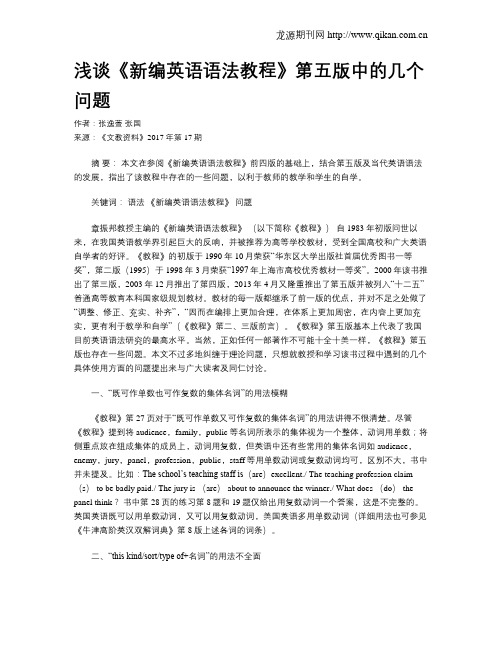
浅谈《新编英语语法教程》第五版中的几个问题作者:张逸萱张国来源:《文教资料》2017年第17期摘要:本文在参阅《新编英语语法教程》前四版的基础上,结合第五版及当代英语语法的发展,指出了该教程中存在的一些问题,以利于教师的教学和学生的自学。
关键词:语法《新编英语语法教程》问题章振邦教授主编的《新编英语语法教程》(以下简称《教程》)自1983年初版问世以来,在我国英语教学界引起巨大的反响,并被推荐为高等学校教材,受到全国高校和广大英语自学者的好评。
《教程》的初版于1990年10月荣获“华东区大学出版社首届优秀图书一等奖”,第二版(1995)于1998年3月荣获“1997年上海市高校优秀教材一等奖”。
2000年该书推出了第三版,2003年12月推出了第四版,2013年4月又隆重推出了第五版并被列入“十二五”普通高等教育本科国家级规划教材。
教材的每一版都继承了前一版的优点,并对不足之处做了“调整、修正、充实、补齐”,“因而在编排上更加合理,在体系上更加周密,在内容上更加充实,更有利于教学和自学”(《教程》第二、三版前言)。
《教程》第五版基本上代表了我国目前英语语法研究的最高水平。
当然,正如任何一部著作不可能十全十美一样,《教程》第五版也存在一些问题。
本文不过多地纠缠于理论问题,只想就教授和学习该书过程中遇到的几个具体使用方面的问题提出来与广大读者及同仁讨论。
一、“既可作单数也可作复数的集体名词”的用法模糊《教程》第27页对于“既可作单数又可作复数的集体名词”的用法讲得不很清楚。
尽管《教程》提到将audience,family,public等名词所表示的集体视为一个整体,动词用单数;将侧重点放在组成集体的成员上,动词用复数,但英语中还有些常用的集体名词如audience,enemy,jury,panel,profession,public,staff等用单数动词或复数动词均可,区别不大,书中并未提及。
比如:The school’s teaching staff is(are)excellent./ The teaching profession claim (s) to be badly paid./ The jury is (are) about to announce the winner./ What does (do) the panel think?书中第28页的练习第8题和19题仅给出用复数动词一个答案,这是不完整的。
进一步探讨英语动词的体
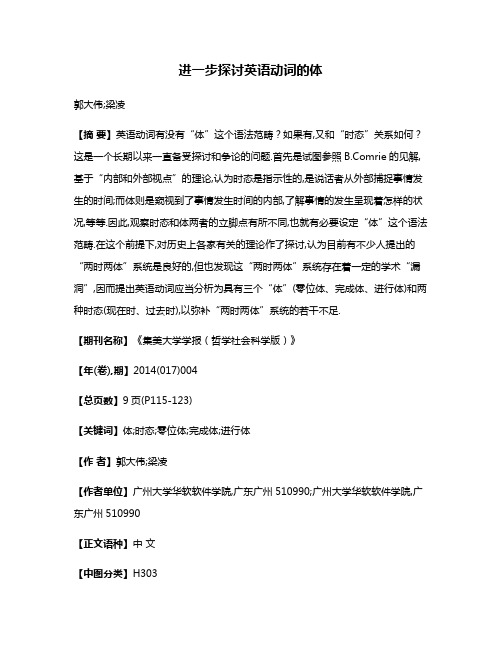
进一步探讨英语动词的体郭大伟;梁凌【摘要】英语动词有没有“体”这个语法范畴?如果有,又和“时态”关系如何?这是一个长期以来一直备受探讨和争论的问题.首先是试图参照rie的见解,基于“内部和外部视点”的理论,认为时态是指示性的,是说话者从外部捕捉事情发生的时间;而体则是窥视到了事情发生时间的内部,了解事情的发生呈现着怎样的状况,等等.因此,观察时态和体两者的立脚点有所不同,也就有必要设定“体”这个语法范畴.在这个前提下,对历史上各家有关的理论作了探讨,认为目前有不少人提出的“两时两体”系统是良好的,但也发现这“两时两体”系统存在着一定的学术“漏洞”,因而提出英语动词应当分析为具有三个“体”(零位体、完成体、进行体)和两种时态(现在时、过去时),以弥补“两时两体”系统的若干不足.【期刊名称】《集美大学学报(哲学社会科学版)》【年(卷),期】2014(017)004【总页数】9页(P115-123)【关键词】体;时态;零位体;完成体;进行体【作者】郭大伟;梁凌【作者单位】广州大学华软软件学院,广东广州510990;广州大学华软软件学院,广东广州510990【正文语种】中文【中图分类】H303英语动词有没有“体”这个语法范畴?有的话,又和“时态”关系如何?这个问题长期以来一直备受探讨和争论,但至今未有良好的结论。
笔者首先试图从一种“内部和外部视点”的理论出发,认为有必要设定“体”这个语法范畴;进而在对历史上各家有关的理论作了探讨之后,认为目前有不少人提出的“两时两体”系统是良好的,但也存在着一定的学术“漏洞”。
为此,提出英语动词可以分析为具有三个“体”(零位体、完成体、进行体)和两种时态(现在时、过去时),以弥补“两时两体”系统的若干不足,请教于读者。
所谓英语动词的“体”(aspect),是一种语法范畴,表现着动词动作的“体貌”(aspectuality)。
正如时态表示动作的时间,语气表示动作的形态那样。
8-Infinitive新编英语语法教程第五版章振邦PPT
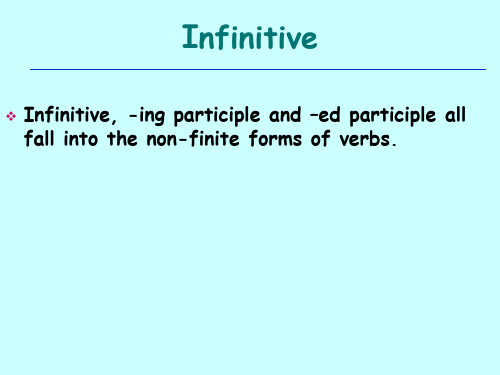
Grammatical forms of infinitive
See more examples of bare infinitive: They can do nothing but/except wait for rescue. Cf: There’s no choice but/except to wait for rescue. Why ask me? Why not ask him? But: What to do? How to do? When to do? Why to do? Go post a letter for me. Try eat a little. Try help him.
Note: help to do and help do are both acceptable.
A test item in TEM 4
"It seems that she was there at the conference." The sentence means that ____. A. she seems to be there at the conference. B. she seemed to be there at the conference. C. she seems to have been there at the conference. D. she seemed to being there at the conference. (2009)
forms of infinitive
2) To-infinitive & bare infinitive----infinitive is usually accompanied by ―to‖, but sometimes without ―to‖ (bare infinitive): Question: Under what circumstances should we use bare infinitive? When following modals, bare infinitive is used. But need & dare may be used in to-infinitive form. Does she dare to go there alone? Do we need to pay for the meal? Following semi-auxiliaries, bare infinitive is used, e.g. You’d better not go out. I happened to meet Mary on the way to the library.
英语语法教学大纲

《英语语法》教学大纲一、课程基本信息【课程编码】【课程中文名称】《英语语法》【课程英文名称】English Grammar【课程类别】专业必修课【适用专业】英语专业【总学时】66学时(其中理论33学时,实验33学时,实训0学时)【周学时】2学时【总学分】2【建议开课学期】一至二学期【建议教材】章振邦、《新编英语语法教程》(第五版)、上海:上海外语教育出版社,2002【参考书】[1]章振邦、《新编英语语法教程》(教师用书)(第五版)、上海:上海外语教育出版社,2002[2]Raymond Murphy、English Grammar in Use(third edition)、Cambridge University Press,2006[3] Sandra N. Erlbaum、Grammar in Context (高级美国英语语法)、北京:外语教学研究出版社,2002[4] 薄冰、《实用英语语法》、太原:山西教育出版社,2004[5] 张成祎、《大学英语语法手册》、上海:上海外语教出版社,2004二、课程性质、目的及教学要求【课程性质】专业必修课【课程目的】本课程的教学目的是让学生通过系统学习,全面构建语法框架,掌握各种语法知识,提高学生在上下文中恰当运用英语语法的能力和运用英语的准确性,使学生能借助英语语法知识解决英语学习过程中的有关问题,提高运用英语交际的能力,从而为听、说、读、写能力的全面提高打下坚固的基础。
【教学要求】通过2学期(约72学时)的英语语法课教学,学生应系统了解语法的体系,掌握语法的核心项目,有计划地阅读英语语法教材,探讨英语语言的结构,通过各种练习牢固地掌握英语语法,提高运用英语的能力。
【成绩考核方式】学期末考试与期中、平时成绩和课堂表现相结合。
期末笔试占总分的70%,期中占总分的10%,平时表现占总分的20%,以百分制计算。
三、教学安排四、章节基本教学内容与要求第一章语法层次和句子结构课时分配:6学时教学主要内容:1、语法层次:词素、词、词组、分句、句子2、句子结构:主+系+表,主+谓,主+谓+宾,主+谓+直宾+间宾,主+谓+宾+宾补3、句子的种类:简单句、并列句、复杂句和并列复杂句教学要求:1、了解:词素、词和词组的定义及分类2、能辨别各种分句、划分句子成分、确定句子的种类3、能按英语五种基本句型造句教学重点:分句及句子的种类、五种基本句型教学难点:划分句子成分、按五种基本句型造句第二章名词及名词属格课时分配:4学时教学主要内容:1、名词的分类2、名词的数:规则复数和不规则复数、集合名词、物质名词、抽象名词、专有名词的数3、单位词及名词的属格教学要求:1、了解名词的性及所有格2、能区分名词的种类、掌握各类名词的复数形式3、掌握常用的单位词教学重点:名词分类、各类名词的复数形式教学难点:各类名词之间的转化第三章主谓一致课时分配:4学时教学主要内容:1、主谓一致三原则2、谓语动词需用单数的情况4、谓语动词需用复数的情况4、以集体名词作主语的主谓一致问题5、以并列结构作主语的主谓一致问题6、其他方面的主谓一致问题教学要求:1、了解主谓一致三原则2、能根据主语确定谓语的形式教学重点:集体名词作主语的主谓一致问题教学难点:并列结构作主语的主谓一致问题第四章冠词课时分配:4学时教学主要内容:1、冠词的分类:定冠词、不定冠词及零冠词2、各类名词前的冠词用法:冠词与专有名词、普通名词3、冠词的其他用法教学要求:1、了解冠词的类指和特指用法2、掌握定冠词、不定冠词及零冠词的用法教学重点:各类名词前的冠词用法教学难点:冠词的综合运用第五章动词概说课时分配:2学时教学主要内容:1、动词的分类:主动词和助动词;及物动词和不及物动词;限定动词和非限定动词;规则动词和不规则动词;单词动词和词组动词2、动词的基本形式3、助动词的基本用法:do,be,have,will4、情态动词的基本用法5、情态动词的推测性用法教学要求:1、了解动词的分类及基本形式2、掌握助动词、情态动词的基本用法及情态动词的推测性用法教学重点:助动词的基本用法及情态动词的推测性用法教学难点:情态动词的推测性用法第六章动词的时和体课时分配:8学时教学主要内容:1、16种时态的形式及用法2、一般过去时和现在完成时的用法比较3、现在完成体和现在完成进行体的用法比较4、过去完成体和过去完成进行体的用法比较5、现在进行时、过去进行时和将来进行的用法6、将来时的表示法教学要求:1、记住16种时态的形式及用法2、掌握完成体和完成进行体的区别、将来时的表示法3、能正确使用各种时态教学重点:与各种时态连用的时间状语、固定句型;完成体和完成进行体的区别及将来时的表示法教学难点:时态的综合运用第七章被动语态课时分配:4学时教学主要内容:1、主动句和被动句的转换2、词组动词的被动句3、非限定动词的被动态4、被动句的用法:两种被动语态的转换5、被动结构和被动意义:主动结构表示被动意义的问题;被动结构和系补结构的区别教学要求:1、了解主动句和被动句的转换规则、非限定动词的被动态2、能将主动句变成被动句、掌握被动句使用的场合3、掌握两种被动语态的转换、能区别被动结构和系补结构教学重点:主动句变成被动句、两种被动语态的转换教学难点:被动结构和系补结构的区别、主动句和被动句的综合运用第八章虚拟语气课时分配:6学时教学主要内容:1、语气概述2、虚拟语气用在非真实条件句中:错综虚拟语气、含蓄虚拟语气3、be-型虚拟式(1)用于表示命令、决定、建议等词语之后的that-分句中(2)用于由if, though等引导的分句中(3)用于某些公式化语句中4、虚拟语气用于以下词及短语后:wish,only if,as if,as though,wouldrather,would sooner,It’s time that…教学要求:了解语气的定义及分类;掌握不同条件下动词的虚拟式教学重点:错综虚拟语气、含蓄虚拟语气、be-型虚拟式教学难点:虚拟语气的综合运用第九章非谓语动词课时分配:10学时教学主要内容:1、动词不定式(1)动词不定式的结构形式和句法功能(2)不定式符号的省略问题(3)不定式符号to与介词to的辨别问题2、动名词(1)动名词的结构形式和句法功能(2)既能接动词不定式又能接动名词的动词3、分词(-ing分词和-ed分词)(1)-ing分词和-ed 分词的结构形式与句法功能(2)-ing分词和-ed分词的用法比较(3)关于“垂悬分词”教学要求:1、掌握谓语动词的各种形式及句法功能2、牢记非谓语动词的固定搭配3、掌握不同的非谓语动词担任同一种句子成分的区别教学重点:非谓语动词的固定搭配;非谓语动词作状语、定语及补语的用法教学难点:分词的独立主格结构、“垂悬分词”及非谓语动词的复合结构第十章名词性从句课时分配:4学时教学主要内容:1、名词性从句的分类2、引导名词性从句的连词及连接词的用法3、主语从句、表语从句、宾语从句及同位语从句的用法4、直接引语变间接引语教学要求:1、能确定名词性从句的种类,正确使用引导名词性从句的连词及连接词2、能将陈述句、疑问句、感叹句、祈使句变成间接引语教学重点:引导名词性从句的连词及连接词;直接引语变间接引语教学难点:直接引语变间接引语第十一章关系分句(定语从句)课时分配:4学时教学主要内容:1、限制性关系分句和非限制性关系分句2、关系代词和关系副词的用法3、由“介词+关系代词”引导的分句结构4、关系分句中的主谓一致关系5、双重关系分句和嵌入式关系分句教学要求:1、了解关系代词和关系副词的功能2、能正确使用关系代词和关系副词3、掌握双重关系分句和嵌入式关系分句的用法教学重点:关系代词和关系副词的用法;由“介词+关系代词”引导的分句结构教学难点:双重关系分句和嵌入式关系分句第十二章IT-句型课时分配:4学时教学主要内容:It句型的用法:先行it 、虚义it 、强调it 、分裂句引导词教学要求:掌握It在不同句型中的用法教学重点:先行it 、虚义it 、强调it教学难点:虚义it第十三章倒装课时分配:2学时教学主要内容:1、全倒装与部分倒装2、引起部分倒装的情况教学要求:掌握倒装的用法教学重点:部分倒装教学难点:部分倒装第十四章从句子到语篇(2学时)课时分配:4学时教学主要内容:1、句子的意义和交际功能;句子结构的正确性和适合性2、连句成篇的逻辑纽带、语法纽带和词汇纽带3、语篇结构—句子、语段、语篇教学要求:了解连句成篇的手段教学重点:连句成篇的逻辑纽带、语法纽带和词汇纽带教学难点:语篇结构—句子、语段、语篇保山学院外国语学院执笔人:杨华英教研室主任:林云日期:2013年8月17日课程教学大纲编写审核表。
非谓语动词在谓语中用法
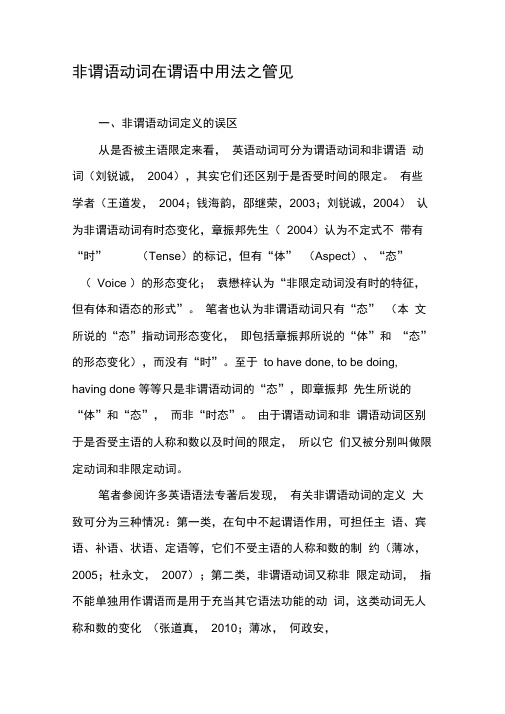
非谓语动词在谓语中用法之管见一、非谓语动词定义的误区从是否被主语限定来看,英语动词可分为谓语动词和非谓语动词(刘锐诚,2004),其实它们还区别于是否受时间的限定。
有些学者(王道发,2004;钱海韵,邵继荣,2003;刘锐诚,2004)认为非谓语动词有时态变化,章振邦先生(2004)认为不定式不带有“时”(Tense)的标记,但有“体”(Aspect)、“态”(Voice )的形态变化;袁懋梓认为“非限定动词没有时的特征,但有体和语态的形式”。
笔者也认为非谓语动词只有“态” (本文所说的“态”指动词形态变化,即包括章振邦所说的“体”和“态”的形态变化),而没有“时”。
至于to have done, to be doing, having done 等等只是非谓语动词的“态”,即章振邦先生所说的“体”和“态”,而非“时态”。
由于谓语动词和非谓语动词区别于是否受主语的人称和数以及时间的限定,所以它们又被分别叫做限定动词和非限定动词。
笔者参阅许多英语语法专著后发现,有关非谓语动词的定义大致可分为三种情况:第一类,在句中不起谓语作用,可担任主语、宾语、补语、状语、定语等,它们不受主语的人称和数的制约(薄冰,2005;杜永文,2007);第二类,非谓语动词又称非限定动词,指不能单独用作谓语而是用于充当其它语法功能的动词,这类动词无人称和数的变化(张道真,2010;薄冰,何政安,2004);第三类,非谓语动词可以和助动词或情态动词组成谓语,但不能单独作谓语(王嘉玲,王占梅,1980)。
这三种定义在非谓语动词所包括的种类的界定上大同小异,但是基本含义却大相径庭。
第一类以薄冰为代表提出的非谓语动词的定义认为,非谓语动词可以充当谓语以外的任何句子成分,但非谓语动词不能充当谓语成分,这是一种错误的说法。
笔者认为非谓语动词不是不能做谓语,只是不能单独作谓语而已,例如:[1] The next train to Beijing will leave at 8 a.m.[2] Hurry up! We 're all wa iting for you.[3] I 've been writing letters for an hour.[4] Peter has helped John. (章振邦,2009)例[1][2][3][4] 中的谓语中的leave (不定式),waiting (现在分词),bee n (过去分词),writing (现在分词)‘helped (过去分词)都是非谓语动词,但又都是谓语的重要组成部分。
章振邦《新编英语语法》Lecture_10课件
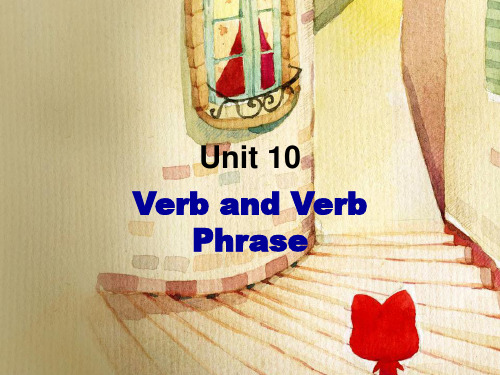
P108
Dynamic Verb
Dynamic verbs are verbs that refer to actions. They can be subclassified into three categories, durative, transitional and momentary verbs. These verbs normally admit of both the progressive and the non-progressive aspect. With momentary verbs, the non-progressive form indicates a single movement and the progressive form indicates a repeated movement.
Transitive verbs
Complementation
Intransitive verbs
Linking verbs Dynamic verbs P110
Main verbs
Word meaning
Stative verbs Single-word verbs
Word formation
Phrasal verbs
P111
Stative verbs
Stative verbs are verbs that refer to present or past states. They are not normally used with the progressive aspect except in certain cases where there is a transfer of meaning. They can be subclassified into 4 categories:
章振邦英语语法第五版Tense and Aspect终版.ppt

At a definite point or period of time in the past
• Using the simple past to denote an event/state happened or existed at a definite point or period of time in the past.
e.g. In those days they sowed wheat by hand. He worked in a bank all his life.
15
Temporary habit
• Using the past progressive to denote a temporarily habitual action in the past.
Albatrosses were large birds.<marked>
The speaker does not commit himself to the continuation of the past state of affairs it describes into the present, while it does not exclude the possibility of such a continuation. It is possible to assert:
• E.g. ---- What are you doing? ---- I’m writing a letter.
12
Referring to the past
13
• Habitual behavior • Temporary habits • Immediate vs. Historic • At a definite point or period of time
时和体
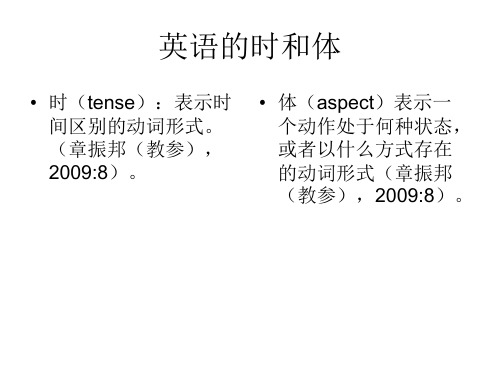
Scarf used to ____(take) a walk. Scarf is used to ______(take) a walk. used to + do:“过去常常”表 示过去习惯性的动作或状态,但 如今已不存在。例如: be used to + doing: 对……已 感到习惯,或"习惯于",to是介 词,后需加名词或动名词。
11.28 时态 一般现在时 一般过去时
时态与时间状语
时间状语 every…, sometimes, at…, on Sunday等 yesterday, last week, an hour ago, the other day, in 1982, just now等
一般将来时
现在完成时
next…, tomorrow, in+一段时间, before+时间点等
以 do 为例
动作 时间
一般
进行
完成
完成进行
现在 过去 将来 过去将来
状态 时间 现在 过去
一般
进行
完成
完成进行
do does
am/is/are+ doing was/were+ doing
has/have+ done had+ done
has/have+ been doing
did
had+ been doing will/shall+ have been doing Would/should+ have been doing
• (2)表示心理状态的动词 • know, realize, think see, believe, suppose, imagine, agree, recognize, remember, want, need, forget, prefer, mean, understand, love, hate等。 • I need your help. • He loves her very much. • (3)瞬间动词 • accept, receive, complete, finish, give, allow, decide, refuse • I accept your advice. • (4)系动词 • seem, remain, lie, see, hear, smell, feel, taste, get, become, turn等。 • 例如:You seem a little tired.
章振邦新编英语语法Lecture1920不定式教学课件

P223 Ex.19A
19.2 Notes on the use of the infinitive sign
1) The infinitive sign used alone: To avoid repetition, the infinitive sign can sometimes be used alone, i.e. the base in the to-infinitive can be omitted, even together with its complementation, especially in informal style, e.g.:
• Type II – The subject of the main clause is the logical object of the infinitive. The adjectives are generally stative adjectives, e.g.: – That question is difficult to answer. This first subtype can be transformed into: – To answer that question is difficult. – It is difficult to answer that question.
19.1 Forms of the infinitive
1) Grammatical forms – The infinitive has no tense distinctions, nor person or number contrasts. But they can be passive and take the simple (to write), progressive (to be writing), perfective (to have written) and perfective progressive (to have been writing) forms. A negative infinitive is formed by adding not or never immediately before the infinitive sign to. The passive infinitive is formed by to be +ed-participle or to have been + ed-participle.
章振邦《新编英语语法》Lecture11&12课件
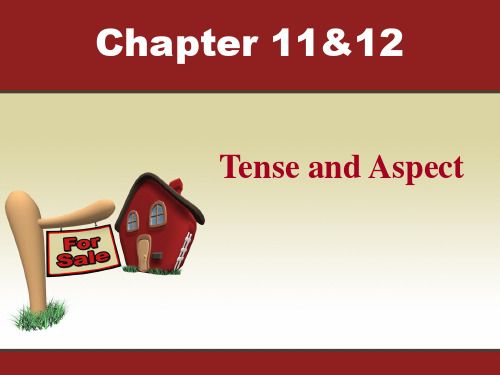
Simple present referring to the past
This use of the simple present is usually found with “communication verbs” such as tell, say, hear, learn, gather, to express the present effect of information received in the past, e.g.: Alice tells (= told / has told) me you’re entering college next year. I hear (=heard / have heard) poor old Mrs Smith has lost her son. Historical / dramatic present: It is so-called because the simple present is used as a device of story-telling and news reporting to add vividness to the description, e.g.: …I was just dozing off in front of the television when my wife rushes in shouting that the kitchen is on fire.
Simple present referring to the future
That-clauses following “I hope,”, “I bet,” etc. e.g.: I hope you have a good time. I bet it rains tomorrow. That-clauses following such constructions as “see to it,” “make sure,” “make certain,” etc. e.g.: I’ll see (to it) / make sure / make certain (that) you don’t get lost. Conditional / temporal clauses introduced by if / when, e.g.: Will you go and help to get in the crops when the harvest time comes? If it is fine tomorrow, we will go to the countryside.
章振邦英语语法第五版L5

Generic and specific reference
concepts
The bull terrier(牛头犬与狸杂交而生的狗) makes an excellent watchdog. A bull terrier makes an excellent watchdog. Bull terriers make excellent watchdog. Nora has been studying the medieval mystery play. Nora has been studying a medieval mystery play. Nora has been studying medieval mystery plays. The -- generic function (no difference in subject/nonsubject positions) A --- one, any representative member of the class Zero – a subset of one group, undifferentiated whole
indefinite specific reference – a person or an object cannot be definitely identified. commonly expressed by A/AN or ZERO ARTICLE e.g.
Old Tom owns a dog and a cat. The dog’s name is Boris; the cat’s name is Blackie. I’ve just been back from the market. Here’s a letter for you. The streets are clean and are shared with trees.
章振邦英语语法

章振邦英语语法English grammar is a complex and nuanced system that has been the subject of extensive study and debate for centuries. One individual who has made significant contributions to the understanding and teaching of English grammar is Zhang Zhenban. Zhang is a renowned linguist and educator who has dedicated his career to exploring the intricacies of the English language and sharing his insights with students and scholars around the world.At the heart of Zhang's approach to English grammar is a deep respect for the language's rich history and a commitment to helping learners develop a comprehensive understanding of its structural and functional elements. He recognizes that English is not a static language but rather a dynamic and ever-evolving means of communication that has been shaped by a multitude of cultural, social, and historical influences.One of the key tenets of Zhang's philosophy is the importance of context in the study of grammar. He argues that grammar cannot be understood in isolation but must be examined within the broaderframework of language use and communication. By considering the ways in which grammar interacts with factors such as register, tone, and audience, Zhang helps students develop a more nuanced and practical understanding of how the language works.Another central aspect of Zhang's approach is his emphasis on the role of syntax in shaping meaning. He believes that a deep understanding of sentence structure is essential for effective communication, as the way in which words are arranged can profoundly impact the message being conveyed. Through his teaching and research, Zhang has helped to elucidate the complex interplay between syntax and semantics, providing learners with the tools they need to navigate the intricacies of English grammar with confidence.In addition to his work on syntax, Zhang has also made significant contributions to the study of morphology, the branch of linguistics that deals with the structure and formation of words. He has explored the ways in which affixes, roots, and stems interact to create the rich tapestry of the English lexicon, and has helped to shed light on the historical and etymological origins of various linguistic elements.One of the hallmarks of Zhang's teaching style is his ability to make complex grammatical concepts accessible and engaging for learnersof all levels. He is known for his use of clear and concise explanations, as well as his incorporation of real-world examples and practical exercises that help students to apply their knowledge in meaningful contexts.In addition to his work in the classroom, Zhang has also been a prolific writer and researcher, authoring numerous books and articles on various aspects of English grammar and linguistics. His publications have been widely acclaimed for their depth of analysis, clarity of presentation, and innovative approaches to language learning and teaching.Despite the complexity and breadth of his work, Zhang remains committed to the idea that the study of grammar should be an enjoyable and rewarding experience. He believes that by fostering a sense of curiosity and wonder about the English language, learners can not only improve their communication skills but also gain a deeper appreciation for the richness and diversity of human expression.In conclusion, Zhang Zhenban's contributions to the field of English grammar have been truly remarkable. Through his tireless efforts as an educator, researcher, and writer, he has helped to shape the way in which the language is understood and taught around the world. His insights and approaches have been instrumental in helpinglearners of all backgrounds to develop a more nuanced and sophisticated understanding of the English language, and his legacy will undoubtedly continue to inspire and influence generations of students and scholars to come.。
新编英语语法教程(第五版)练习答案完整版章振邦主编
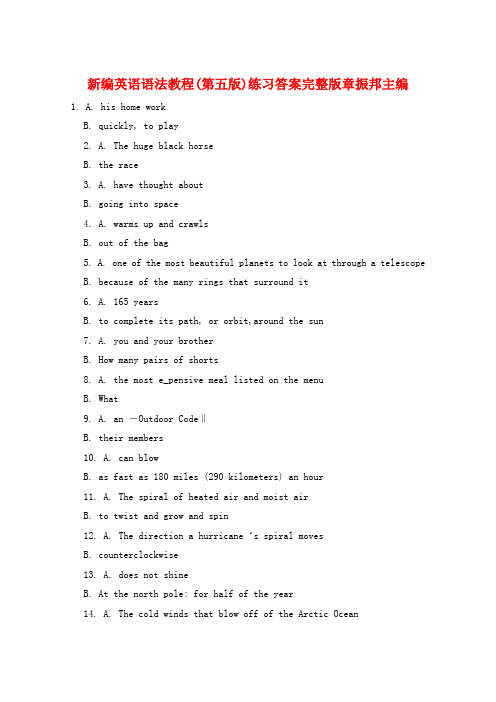
新编英语语法教程(第五版)练习答案完整版章振邦主编1. A. his home workB. quickly, to play2. A. The huge black horseB. the race3. A. have thought aboutB. going into space4. A. warms up and crawlsB. out of the bag5. A. one of the most beautiful planets to look at through a telescopeB. because of the many rings that surround it6. A. 165 yearsB. to complete its path, or orbit,around the sun7. A. you and your brotherB. How many pairs of shorts8. A. the most e_pensive meal listed on the menuB. What9. A. an ―Outdoor Code‖B. their members10. A. can blowB. as fast as 180 miles (290 kilometers) an hour11. A. The spiral of heated air and moist airB. to twist and grow and spin12. A. The direction a hurricane‘s spiral movesB. counterclockwise13. A. does not shineB. At the north pole: for half of the year14. A. The cold winds that blow off of the Arctic OceanB. a very cold place15. A. might have beenB. guilty of murderE_. 1B1. SVCWithin the stricken area, not a single soul remained alive, and the city centre looked as if it had been razed by monster steam-roller.2. SVThe bomb e_ploded 1,000 ft. above the groun.3. SVOOn August 6, 1945, an American aircraft dropped a bomb on the Janpanese town of Hiroshima.4. SvoOThree days later, yet another bomb of the same kind gave the town of Nagasaki the same fatal blow.5. SVOCThe e_plosion made one and a half square miles of the city an e_pense of reddish rubble.6. SVAWithin the fraction of a second, the bomb changed from a metal cylinder into an immense mass of enpanding gas, millions of degrees hot.7. SVOA。
- 1、下载文档前请自行甄别文档内容的完整性,平台不提供额外的编辑、内容补充、找答案等附加服务。
- 2、"仅部分预览"的文档,不可在线预览部分如存在完整性等问题,可反馈申请退款(可完整预览的文档不适用该条件!)。
- 3、如文档侵犯您的权益,请联系客服反馈,我们会尽快为您处理(人工客服工作时间:9:00-18:30)。
Past, present, future
[now] PAST TIME
[preceding now]
FUTURE TIME
[following now]
PRESENT TIME
[including now]
On this semantic level of interpretation, ‘present’ is the most general and unmarked category. Albatrosses were large birds.<marked> The speaker does not commit himself to the continuation of the past state of affairs it describes into the present, while it does not exclude the possibility of such a continuation. It is possible to assert: Albatrosses were, are, and always will be large birds.
Eternal present Habitual behavior Temporary habit Momentary behavior Instantaneous behavior Behavior of the present moment
Eternal truths
• Using the simple present to the stative verbs to express eternal truths or proverbs, as well as in scientific, mathematical, geographical and other statements made for all time. • E.g. • Honesty is the best policy. A rolling stone gathers no moss.
• E.g. George was getting up at five every day that week.
Immediate vs. Historic
• Communicative verbs such as “tell, talk, say, exaggerate” with the present progressive to denote an action in the immediate past.
e.g. He left 10 minutes ago.
• Using the past perfective to denote a state/action in completion before a specific past.
e.g. I had written the article when he came.
e.g. I don‟t know what you are talking about.
„say, understand, hear, learn‟ with the simple present, the simple past, present perfective Martin tells me the Smiths are moving from No. 20. Braham is/was the last great representative of German classicism. The Book of Genesis speaks of the terrible fate of Sodom and Gomorrah.
Behaviors of the present moment
• Using the present progressive to durative dynamic verbs to denote what is going on at the present moment.
• E.g. ---- What are you doing? ---- I‟m writing a letter.
• Information received in the past
present effect
present result
Habitual behavior
• Using the simple past to denote a habitual or recurrent action in the past.
e.g. In those days they sowed wheat by hand. He worked in a bank all his life.
Temporary habit
• Using the past progressive to denote a temporarily habitual action in the past.
• Using the simple present to stative verbs to express a momentary phenomenon existing at the time of speaking e.g. What‟s the matter with you? You look pale.
Referring to the past
• • • •
Habitual behavior Temporary habits Immediate vs. Historic At a definite point or period of time
state exists action in completion action in progressive
• Historic present • describing the past as if it is happening now: conveying sth. Of the dramatic immediacy of an eye-witness account, such as story-telling, news reporting, to add vividness to the description e.g. I was just dozing off in front of the television when my wife rushes in shouting that the kitchen is on fire.
• Authors often use a kind of ‘timeless present’ in addressing their readers about the contents of their books. E.g. • The last example shows that…
Habitual behavior
Using the present progressive to express a temporary habit.
e.g. He‟s working in a chemical factory these days.
Momentary vs. Instantaneous behavior
• INSTANTANEOUS PRESENT occurs where the verb refers to a single action begun and completed approximately at the moment of speech.
• Rather restricted situations occur
• 1) commentaries: • Fernandez shoots! • 2) demonstrations and other self-commentaries: • I enclose a form of application. • 3) special exclamatory sentences with initial adverbials: • Here comes the winner! • 4) performatives: • apologize, advise, request, predict, etc.
• Using the simple present to dynamic verbs to express habitual or ecurrent present.
e.g. Father doesn‟t smoke. Percy often goes to his office by underground. Verbs of stative meaning may sometimes be used in a habitual sense when accompanied by a frequency adverbial: E.g. She is seldom alone.
• Using the simple present to dynamic verbs to denote instantaneous actions. e.g. I declear the meeting open. Haper passes the ball to Jenning; Jennings shoots and the goalkeeper leaps for it but --- yes, it‟s a goal.
Basic concepts: tense and aspect
• One way of expressing the notion of time linguistically is by means of tense. • Aspect is a grammatical term indicates whether an action or state at a given time is veiwed as completed or incomplete.
